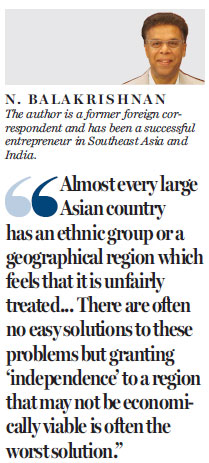'Independence' not always the best solution for a society's problems
Updated: 2016-05-13 07:36
By N. Balakrishnan(HK Edition)
|
|||||||||
Those seeking "independence" for Hong Kong might be well advised to study the history of how the two "new nations", one in Asia and one in Africa, that became independent in the 21st century are faring. In fact, both of them are faring badly. They are faring badly economically despite both of them being oil producers and they are faring poorly politically too with widespread political unrest.
"Independence" for nations is not what it used to be. After World War II many nations, especially some in Asia such as Indonesia, India and the Philippines, declared their independence after long struggles and after defeating European colonial powers that had crossed oceans to oppress other nations. Despite the mixed economic record of many of these "new" nations that became independent in the 20th century, no one is longing to bring back their white colonial "masters".
However, like many things, the 21st century seems to have devalued "independence" too. The two new nations were not recently "liberated" from European masters living far away. That had already happened in both cases. The new nations chose to break away from their neighbors sharing geography and culture because they felt, rightly or wrongly, "oppressed" by the countries near them. These new nations were cheered on by the usual cabal of Western academics, "human rights" organizations and Hollywood stars.
The "rent a cause" crowd of Hollywood stars and people interested in poking their noses into other people's affairs have become bored and moved on to other "causes" and have largely forgotten the plight of the new nations. News about these two new nations, which used to be common in the international media, is now hard to find. The media may not cover it but the economic situation in both countries is far worse than when they first became independent.
The sad fact is these new nations would have been better off being an autonomous region remaining within larger countries.
Large nations such as China, India and Indonesia inevitably have regions and cultures with different interests within their borders. But this does not mean that each region or cultural group will be better off as an "independent" nation. Almost every large Asian country has an ethnic group or a geographical region which feels that it is unfairly treated. In some cases, the complaints may be justified but in many cases they are not. There are often no easy solutions to these problems but granting "independence" to a region that may not be economically viable is often the worst solution, as we have already seen in two instances in this century.
China is not the only nation that will not allow its regions to break away over some differences. For example, how the slave-owning South and North of the US fought a very bitter civil war in the 19th century. The war was fought not primarily to abolish slavery but to keep the "union" intact.
Hong Kong is a late comer to this "independence" game so it might be worthwhile for us to discuss how the word has changed its meaning in the context of how the two new nations founded in the 21st century are faring now.
After the US declared its "independence" from Britain in 1776, there was a long lull in acts of "independence" among nations. The French Revolution that followed succeeded only in giving independence to some of its overseas territories. One of these former French territories was a wealthy region at the time of its independence in 1804, but now is the poorest nation in the Western Hemisphere, thus proving that independence alone does not guarantee prosperity.
Even after the French Revolution fought for "Liberty, Equality and Fraternity", the French went on under a restored monarchy to colonize Vietnam, many Pacific islands and so on. The British conquest of India happened mostly after the American Revolution.
The Philippines became the first Asian republic briefly in 1898, after freeing itself from 400 years of Spanish rule. But the US took away that freedom and the Philippines did not achieve its full freedom again until 1946.
What we have in Hong Kong is a hybrid system of "One Country, Two Systems" that almost no large nation has granted its special regions. Like any hybrid system, "One Country, Two Systems" has its problems. But the fact it has persisted for nearly two decades shows that it is a workable solution, especially since it has survived through the Asian financial crisis of 1997 and the deflation years of the early 21st century.
"Independence" is not always the best solution or the only solution to the woes of a society, be it Hong Kong or any other society undergoing worse problems, for that matter. We had better study history before fighting for a false solution.

(HK Edition 05/13/2016 page9)